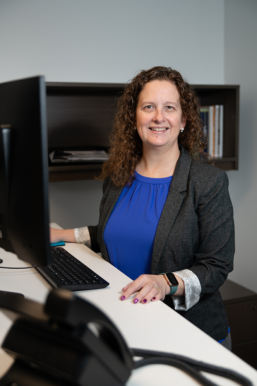A taxing year
Accountants grapple with ghosts of 2020 this tax season
Jason Roop //January 29, 2021//
A taxing year
Accountants grapple with ghosts of 2020 this tax season
Jason Roop //January 29, 2021//
After a turbulent business year, accountants are bracing for a tax season filled with increased uncertainty, complexity and the looming reality that, eventually, 2020 taxes will be due and books must be reconciled.
Businesses navigating the pandemic — from entrepreneurs launching their first ventures to corporations with experienced CFOs — face new questions and challenges in preparing their 2020 taxes.
There is the potential for shifting tax deadlines. Virginia state and federal tax guidelines don’t align. And there are pandemic-specific financial issues such as relief loans and grants, layoffs, unexpected losses and remote workers.
That’s not to mention preparing for 2021 taxes, says Courtney Arrington, an accountant in the alternative assets group at Richmond-based Genworth Financial Inc. who also independently provides accounting and bookkeeping services. One big question her clients ask, Arrington says, is “how they can plan for this upcoming year.”
However, clients could be forgiven for not yet thinking about 2021 — after all, so much still seems stuck in 2020. Waiting on vaccines. Waiting on relief funding. Waiting on tax returns, in some cases. One of the business owners Arrington works with had yet to receive a return from a 2019 filing as of December 2020. “It’s literally just been a waiting game,” she says.
In helping businesses work through answers to these challenges, CPAs and accounting firms find themselves in a sort of time warp. They must follow some traditional deadlines while other deadlines change, and wait on clarifications from the IRS, Congress and the Virginia General Assembly about various rules and regulations.
As of mid-January, no decisions had yet been made about possible postponement of federal and state tax return deadlines this year, but delays are unlikely, “assuming no major shutdowns,” says Gary Thomson with Richmond-based Thomson Consulting, which advises CPA and professional services firms.
The unique situation also has seen an evolution of the roles accountants play for clients.
“It’s gone beyond traditional tax advice and consulting,” says Stephen Kimberlin, a senior tax manager based in Richmond with Charlotte, North Carolina-based Dixon Hughes Goodman LLP (DHG). Accounting firms have become “more of a true adviser to our clients,” he says.

And it isn’t all about mopping up after a doom-and-gloom year. Many businesses, such as those focused on e-commerce, trucking or other essential services, have performed well during the pandemic, Kimberlin says, and accountants are helping those clients with financial planning to maintain that momentum.
For companies that have struggled, such as those in the hospitality or real estate industries, he says, the focus shifts to helping them navigate operational, budgeting and planning challenges. “We’re trying to help them emerge stronger,” he says.
Conformity woes
One major wrinkle for Virginia CPAs preparing 2020 taxes is the commonwealth’s status as a static conformity (or fixed date) state for tax purposes. Virginia is one of about 20 states that freeze conformity of state tax rules with federal tax code as of a particular date. Currently, Virginia’s state tax laws conform with pre-pandemic IRS code as it existed on Dec. 31, 2019.
The Virginia General Assembly is considering legislation this session (HB 1935, SB 1146) that would make 2020 state tax rules conform with the latest IRS code, carving out some exceptions including provisions of the federal CARES (Coronavirus Aid, Relief, and Economic Security) Act related to the net operating loss limitation and carryback.
Whenever Virginia doesn’t conform with federal tax laws, “it adds complexity” for accountants and CPAs, says Emily Walker, vice president of advocacy for the Virginia Society of CPAs.
Usually this is handled with the early passage of emergency legislation that can go into effect as soon as the governor signs it, she says. But conforming with federal tax laws this year would represent a loss of up to $500 million in state tax revenues over the next two years. And that makes it a lot less clear whether lawmakers will support it during a tight time for revenues, Walker adds, though most of that $500 million would stay in the coffers of businesses operating in Virginia if the legislature chooses to conform this year.
Another issue that falls under tax conformity is how Virginia will handle forgivable loans businesses received through the Small Business Administration’s Paycheck Protection Program (PPP).
In its December 2020 stimulus package, Congress stipulated that PPP funds would be exempt from federal corporate taxes and also allowed businesses to deduct expenses paid with PPP funds. Typically with forgivable loans, either the loan is tax exempt or deductions are allowed, but not both, Walker says. The Northam administration is opposed to allowing corporate tax deductions for business expenses paid with PPP funds. On Jan. 18, the House Finance Committee voted that Virginia’s conformity policy should not include PPP expense deductions for businesses. As of press time for this issue, it was unclear how the legislature would ultimately decide on these conformity issues.

this tax season, says Emily Walker, vice president of advocacy for the Virginia Society of CPAs. Photo by Caroline Martin
“The more Virginia deviates from federal tax code, the more complex tax returns get” for accountants, Walker says.
Adding to that intricacy is the fact that unlike federal PPP loans, not all relief funds may be tax exempt or allow for tax deductible expenses.
Across Virginia, accountants are working with clients who received various federal, state, local and private loans and grants to keep their businesses afloat.
And that’s a situation that accounting firms are also experiencing when reconciling their own corporate finances. More than 6,600 U.S. accounting firms received PPP loans, potentially saving more than 210,000 jobs, according to CPA Trendlines Research. A Bloomberg Tax analysis showed almost 38,000 CPA firms had applied for PPP loans.
“This whole situation creates complexity across the board,” Walker says.
Working from home
Another challenge facing taxpayers and their CPAs this year is dealing with the new landscape of closed offices, stay-at-home orders and people hunkering down in locations that may have been outside of the state in which their offices are located.
In Virginia, this is a normal situation for people in the northern area of the state who may work in Washington, D.C., or Maryland — or in Bristol, where someone might live in Virginia but work across the street in Tennessee, where there are no state taxes.
Typically, payroll taxes are paid in the state where employees reside.
For D.C., Maryland and Virginia, there are commuter-based agreements in place that typically cover such cross-state situations, Walker says. But this wasn’t necessarily the scenario during the pandemic, when people may have relocated farther away for long stretches of time — sometimes longer than the typical six months that could make one eligible for permanent residency in another state.
And that brings up new questions: Do employees owe taxes in more than one state? And where should employers pay the payroll taxes?
CPAs must iron it out. There’s an attempt at the federal level for greater clarity and consistent guidelines across the country, but as of January, Walker says, “Virginia’s law hasn’t changed on this front.”
Accounting firms also dealt with their own work-from-home issues, among them the lack of face-to-face time with colleagues, adjusting to new workflows and home offices, and the technology needed to maintain confidentiality while passing client information among their staff.
Nevertheless, by December 2020, 81% of more than 220 U.S. accounting firms planned a moderate to significant increase in teleworking following the pandemic, according to 2020 Anytime, Anywhere Work Survey by leadership and management consulting firm ConvergenceCoaching.
The switch to teleworking went smoothly at DHG, which closed its offices March 15, Kimberlin says. Once teams finished up deadlines in the office, they headed home. The firm already operated in a paperless environment, he says, so employees were prepared with remote access to servers and the necessary equipment to telework. “It wasn’t too bad,” he says.
Strengthening approaches
With so much change, accounting firms sought new ways of working with clients. Sharpening and increasing communication was key for DHG, Kimberlin says, noting the firm’s outreach efforts with educational webinars, blogs and articles, and reaching out directly to clients as needed.
In normal times, CPAs have a good understanding of tax rules before they advise clients. But the pandemic has required them to stay on top of ever-shifting tax forgiveness updates, deadlines and federal guidance. “We’ve had to digest that information quicker,” he says.
In addition to its in-house experts, Kimberlin says, DHG kept up with resources provided by governing bodies within the industry and networked with colleagues at other firms.
For Arrington, who also runs a blog and YouTube channel called “The Accounting Struggle,” outreach included educating new business owners. During the pandemic she saw an uptick in people getting more serious about side hustles such as e-commerce stores, catering companies and social media influencing.
In addition to helping fledgling entrepreneurs understand this new territory, she’s working with them to plan for various if-then scenarios. That way, they will be prepared if certain legislation goes through, or not.
One strength for accountants, who tend to dislike unclear rules and regulations, is that they are “calm, rational people,” Thomson says. “While we like order and process, we equally aren’t people that overreact.”
That means they’re more likely to provide stability for clients by thinking through challenges and waiting things out, rather than making assumptions that could backfire in the face of uncertainty.
However, what’s new for many professionals is learning to offer advice and calmness “with limited information,” Thomson says. “And we just haven’t had to do it that way for clients” in past years.
Kimberlin says accountants have it in them to help clients make the best decisions for their businesses, regardless of the trying circumstances. “We’ll get through it,” he says. “We always do.”
Virginia Business Editor Richard Foster and Deputy Editor Kate Andrews contributed to this story.
s



















